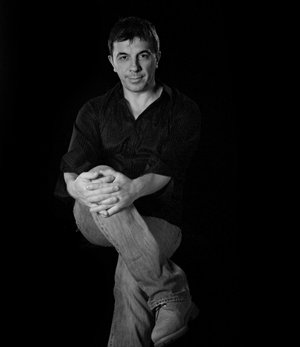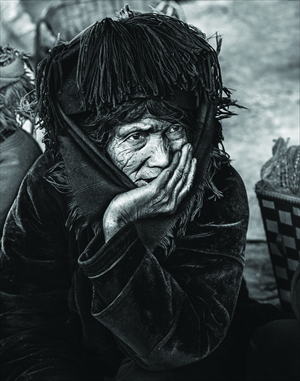HOME >> METRO BEIJING
Portraying paradise
By Zhang Wen Source:Global Times Published: 2013-8-5 18:03:01

Thierry Bornier

Portrait taken in March of a Hani woman in Yuanyang county, Yunnan Province. Photos: Courtesy of Thierry Bornier
China's ancient architecture, diverse ethnic minorities and rapidly changing urban landscape have lured photographers from around the world for decades. But for French photographer Thierry Bornier, few subjects can compare with the simple beauty of rice paddy terraces in scenic Yuanyang county, Yunnan Province.On June 6, Bornier's colorful aerial photograph of the rice terraces was featured in National Geographic. It was his second photograph of the site published by the magazine, with his first appearing three years earlier.
After global exposure, the paddy fields cultivated and maintained by the Hani ethnic minority became China's 45th UNESCO World Heritage Site on June 22.
Journey to the East
Bornier, 42, lives in Kunming, Yunnan Province. During his interview with Metropolitan, he couldn't hide his enthusiasm for the local landscape while showing photos he has taken over the past three years in Southwest China.
"It's a great area for photography because it has a magical combination of the sun, clouds and blue skies. They form to make the most beautiful imagery, particularly at sunset and sunrise," he said.
Aside from being drawn by the region's landscape, Bornier is also fascinated by Southwest China's rich cultural diversity.
"Of all the 56 ethnic minorities [in China], 26 are in Yunnan. There are so many ethnic minorities to discover, it's very exciting. Every place I go, I have one minority waiting for me," he said.
After graduating with an MBA in finance, Bornier worked as chief financial officer at an international fashion giant in New York. But it was a vacation to Yunnan in 2005 that led him to be seduced by what he describes as "amazing" natural beauty.
He traveled solo to landmark tourist spots, including Lijiang, Dali, Shangri-La and Lugu Lake. The more he saw and learned about the region, the stronger his desire grew to stay longer and immerse himself in its culture.
In 2008, he relocated to Shanghai to set up a new accounting system for his company. A few months later, he decided to permanently live in Kunming.
"I went to Kunming because I wanted to yanglao (live out one's life in retirement)," he joked. "Kunming has the best weather in all of China; not too hot, not too chilly. It's a wonderful place to live."
After studying Chinese in Kunming for two years, Bornier returned to his photography roots in earnest in 2010. Beijing, Shanghai and Shenzhen beckoned at various times in 2012 with fashion shoots, but he always savored returning home to Kunming and leaving the hustle and bustle of metropolises behind.
His freelance work schedule allowed him to explore remote parts of western China. It was an experience made all the more enriching by his homestays with people from the Yi, Tibetan and Uyghur ethnic minorities.
"Every place has its local dialect and distinct landscape. There are so many different things to see, and it's good to witness people living their real lives. Even if you don't like [the lifestyles], you can understand them," he explained.
Bornier also sees his mission as capturing a snapshot of China in transition. Growing materialism and urbanization threaten to wipe out the traditional lifestyles led by many ethnic minorities, he claims.
"We should protect [ethnic minorities'] way of life and languages, and try to help them financially to hold on to their traditions," he said.
Equipped with a Nikon D800 E and 24-millimeter 1.4 G lens, he believes it takes more than just an expensive camera to take good photographs.
"Photos are more beautiful with a high quality lens, but it has more to do with the way you use your spirit and your heart," Bornier said. "Taking photos is easy for anyone, but taking professional, amazing photos is achievable for anyone who has a passion or deep feeling."
Capturing 'real' China
Bornier insists his approach to photography involves more than just pointing and shooting, explaining that he often carries out reconnaissance ahead of an expedition.
"You need to know the best time to visit a place to catch its unique beauty. Every place is suited to a specific season. For Yuanyang's rice terraces, February is the best time," he said.
Bornier recounts his most memorable expedition as taking place on his 39th birthday at Milk Lake in Yading, Sichuan Province.
"I climbed for four hours to reach a place where I could have a good view. It's a wonderful place, but the silence was scary. There was no one and no noise other than the wind. It was like being on an island or your own planet," he recalled.
Flipping through Bornier's portfolio tells his life story over the past three years. Around 70 photos depict his travels through Yunnan, Sichuan and Fujian provinces as well as the Guangxi Zhuang, Tibet and Xinjiang Uyghur autonomous regions. His goal is to one day exhibit his photos in China or even Paris.
"Most people, even among Chinese, don't know China," he declares. "They think they know, but they don't know … the 'real' China. China is so big that you need at least three lifetimes to know what exactly is going on. France is so small that after a few days, you already know everything there."
Heritage campaigner
The origin of Yuanyang's heritage listing can be traced to 2010, when Bornier was photographing black-headed gulls at Cuihu Lake in Kunming. By chance, he met two UNESCO officials inspecting Lijiang.
"We chatted and they asked me what places I think should be protected. I told them two places: Yuanyang's rice terraces and Fenghuang county, Hunan Province," he said.
Bornier invited the officials to his home, where he showed them photos of both places.
Over the next five years, he wants to let more people worldwide discover the hidden beauty of China.
"I also wish to find a new spot by myself because I believe somehow, somewhere there must be places no one knows yet," he said.
"Yunnan is my home. I will stay in China because I love it, probably for the rest of my life.
Posted in: Metro Beijing